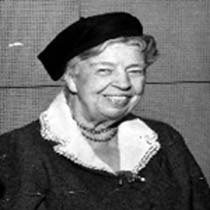
ELEANOR ROOSEVELTEleanor Roosevelt was the main connection for her husband, President Franklin D. Roosevelt, to Black America during his whole presidency. She did this in spite of the President�s need to pacify those in the South who were opposed to any liberties for African Americans. For the most part she was in full support of the civil rights movement. In spite of the help that the President�s New Deal legislation provided to the those in the Southern states she found that Black Americans in Southern regions received a disproportionately smaller share of relief money. She became one of the only voices in the Roosevelt White House to insist that benefits be shared equally to all races. Eleanor angered many when she broke precedent by inviting hundreds of Black American guests to the White House. She was infuriated when the great singer Marian Anderson was denied the use of Washington�s Constitution Hall for a performance. The Daughters of the American Revolution were in control of the Hall and dictated how it was used. She was a member of that organization and resigned her membership in protest. She then went on and arranged another concert on the steps of the Lincoln Memorial. She later presented Anderson to the King and Queen of England after she performed at a White House dinner. Eleanor befriended the Black educator Mary McLeod Bethune and arranged her appointment as Director of the Division of Negro Affairs of the National Youth Administration. Some of her staff objected so to avoid problems with the staff she would greet Bethune at the gate, embrace her and walk with her arm-in-arm on her visits to the White House. To the chagrin of many, including the military, in support of the Tuskegee Airmen she insisted, and did, fly with one of the fighter pilots of that group, Charles �Chief� Anderson. She not only worked openly to support Blacks she also worked behind the scenes. She lobbled for the 1934 Costigan-Wagner Bill to make lynching a federal crime. In that effort she arranged a meeting between the President and NAACP president Walter Francis White. This however was to no avail because the President was in fear of losing the Southern vote. He did not openly support the bill and it was unable to pass the Senate: Following the Japanese attack on Pearl Harbor she spoke out against anti-Japanese prejudice warning against hysteria against this group, including any other, who were faithful citizens of America. She also privately opposed the President's Executive Order 9066 which forced Japanese-Americans in the western part of the country into internment camps. For her outward support of Japanese-American citizens she was widely criticized. This included a call by the Los Angeles Times to the White House that she be forced to retire from public life. Her support of African Americans gained for the Democratic Party their support. This was no small achievement considering that African-Americans were staunch Republicans since the signing of Abraham Lincoln�s Emancipation Proclamation. .  |